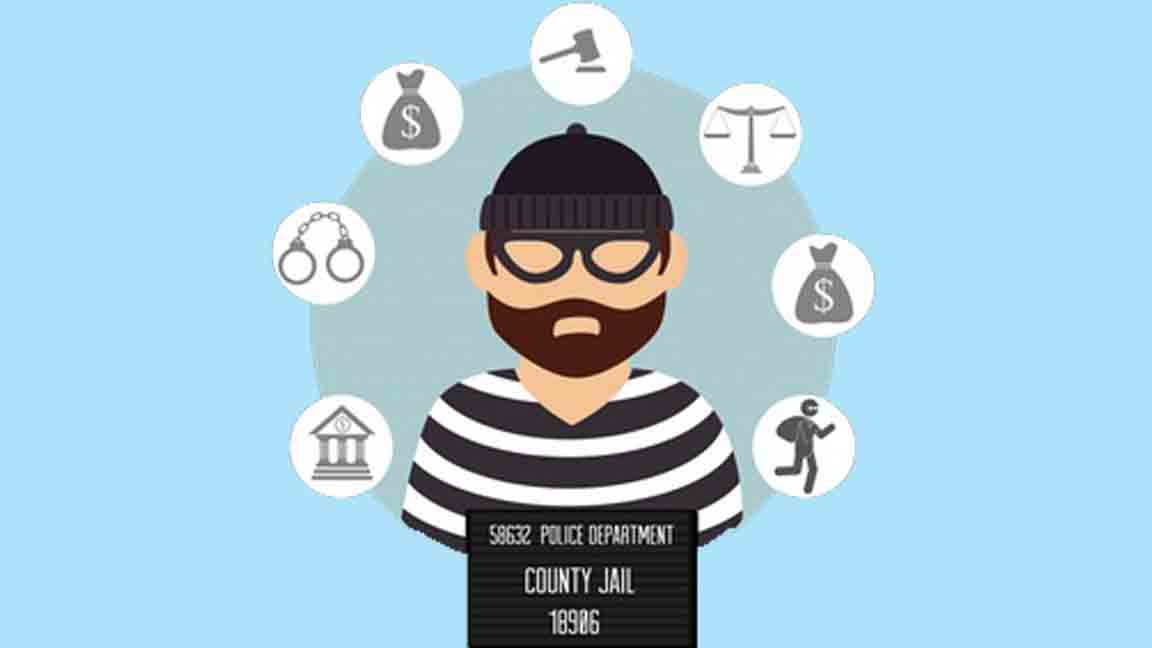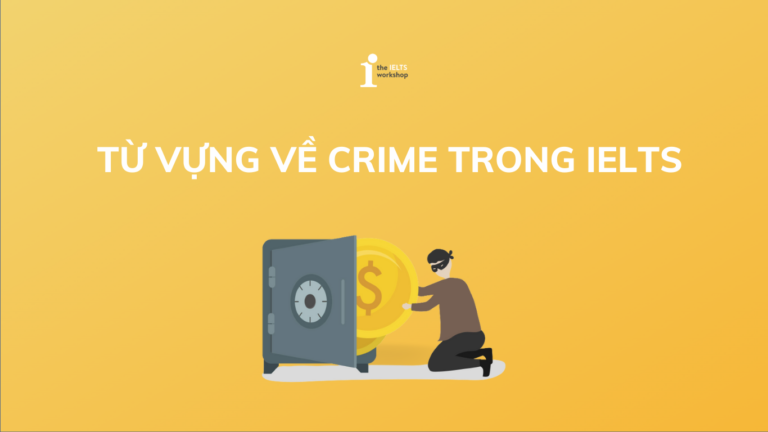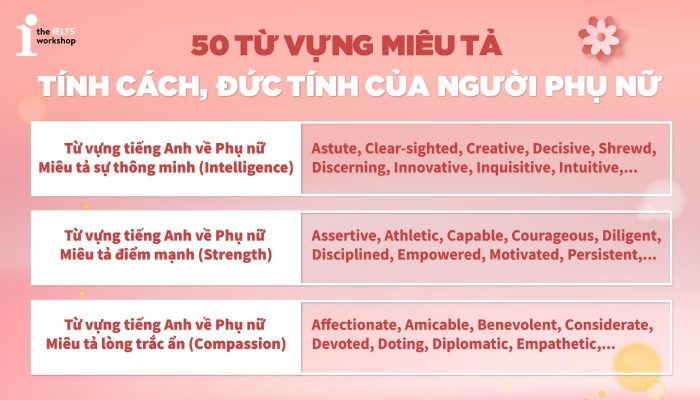Crime (Tội phạm) là một chủ đề hấp dẫn nhưng đồng thời cũng làm cho thí sinh lo lắng vì độ “hóc búa” của nó. Tuy nhiên, nếu tích lũy được vốn từ vựng chất lượng, chắc chắn đây sẽ là cơ hội quý giá để bạn thể hiện vốn từ của và gây ấn tượng cực nhanh với giám khảo trong phần thi IELTS Writing hoặc Speaking của mình. Hãy cùng The IELTS Workshop tìm hiểu trọn bộ từ vựng chủ đề Crime trong bài viết dưới đây nhé!
1. Từ vựng chủ đề Crime: Các loại tội phạm
Để dễ học và ghi nhớ, chúng ta sẽ phân loại các loại tội phạm và những từ vựng liên quan trong bảng dưới đây.
| Loại tội phạm (Crime) | Người phạm tội (Criminal) | Hành động (Verb) | Nghĩa |
| Crimes against Property (Tội phạm về tài sản) | |||
| Theft | Thief | to steal | Trộm cắp (nói chung) |
| Burglary | Burglar | to burgle / to break in | Trộm cắp (đột nhập vào nhà) |
| Robbery | Robber | to rob | Cướp giật (dùng vũ lực, đe dọa) |
| Shoplifting | Shoplifter | to shoplift | Trộm cắp vặt ở cửa hàng |
| Vandalism | Vandal | to vandalize | Phá hoại của công |
| Arson | Arsonist | to set fire to | Phóng hỏa |
| Crimes against People (Tội phạm về người) | |||
| Assault | Assailant | to assault | Hành hung |
| Kidnapping | Kidnapper | to kidnap | Bắt cóc |
| Murder | Murderer | to murder | Giết người, ám sát |
| Other Crimes (Các loại tội phạm khác) | |||
| Smuggling | Smuggler | to smuggle | Buôn lậu |
| Fraud | Fraudster | to defraud | Lừa đảo (tài chính) |
| Bribery | – | to bribe | Hối lộ |
| Terrorism | Terrorist | to terrorize | Khủng bố |
| Drug trafficking | Drug trafficker | to traffic drugs | Buôn bán ma túy |
| Cybercrime | Hacker / Cybercriminal | to hack | Tội phạm mạng |
2. Từ vựng chủ đề Crime: Hình phạt
Sau khi phạm tội, người phạm tội sẽ phải đối mặt với các hình phạt. Dưới đây là các từ vựng liên quan.
| Từ vựng (Vocabulary) | Phiên âm | Nghĩa |
| Fine | /faɪn/ | Tiền phạt (hình phạt nhẹ) |
| Community service | /kəˈmjuːnəti ˈsɜːvɪs/ | Lao động công ích |
| Probation | /prəˈbeɪʃn/ | Án treo (không phải ở tù nhưng bị giám sát) |
| Prison sentence | /ˈprɪzn ˈsentəns/ | Án tù, án giam |
| Life imprisonment | /laɪf ɪmˈprɪznmənt/ | Tù chung thân |
| Capital punishment / Death penalty | /ˈkæpɪtl ˈpʌnɪʃmənt/ | Án tử hình |
| Rehabilitation | /ˌriːəˌbɪlɪˈteɪʃn/ | Sự cải tạo, phục hồi nhân phẩm |
| Deterrent | /dɪˈterənt/ | Biện pháp răn đe |
3. Từ vựng chủ đề Crime: Thuật ngữ dùng trong tòa án
Để thảo luận sâu hơn về chủ đề này, bạn cần biết một số thuật ngữ cơ bản được dùng trong hệ thống pháp luật.
| Từ vựng (Vocabulary) | Phiên âm | Nghĩa |
| Trial | /ˈtraɪəl/ | Phiên tòa xét xử |
| Court | /kɔːt/ | Tòa án |
| Judge | /dʒʌdʒ/ | Thẩm phán (người ra phán quyết) |
| Jury | /ˈdʒʊəri/ | Bồi thẩm đoàn (nhóm người dân quyết định có tội hay không) |
| Lawyer / Attorney | /ˈlɔɪə(r)/ | Luật sư (người bào chữa hoặc đại diện pháp lý) |
| Witness | /ˈwɪtnəs/ | Nhân chứng (người chứng kiến sự việc) |
| Evidence | /ˈevɪdəns/ | Bằng chứng |
| Verdict | /ˈvɜːdɪkt/ | Lời tuyên án, phán quyết cuối cùng |
| To be guilty | /tu bi ˈɡɪlti/ | Bị kết tội, có tội |
| To be innocent | /tu bi ˈɪnəsnt/ | Vô tội |
| Prosecutor | /ˈprɒsɪkjuːtə(r)/ | Công tố viên (người buộc tội) |
| Defendant | /dɪˈfendənt/ | Bị cáo (người bị buộc tội) |
4. Từ vựng chủ đề Crime level B2 – C1
Bạn không thể biết trước được đề thi sẽ hỏi về vấn đề gì. Nhưng bạn hoàn toàn có thể chủ động chuẩn bị kiến thức cho mình. Một số từ vựng về topic Crime bạn cần bỏ túi được tổng hợp trong bảng sau:
| Từ vựng | Phiên âm | Nghĩa |
| Legislation | /ˌledʒ.ɪˈsleɪ.ʃən/ | Pháp luật |
| Justice | /ˈdʒʌs.tɪs/ | Công lý |
| Crime = offense = law-breaking | /kraɪm/ /əˈfens/ /lɑː breɪ.kɪŋ/ | Phạm tội |
| Criminal = Offender = Law-breaker = Wrong-doer | /ˈkrɪm.ə.nəl/ /əˈfen.dɚ/ | Tội phạm |
| Juvenile delinquent | /ˌdʒuː.vən.əl dɪˈlɪŋ.kwənt/ | Tội phạm vị thành niên |
| Juvenile delinquency | /ˌdʒuː.vən.əl dɪˈlɪŋ.kwən.si/ | Vụ phạm tội vị thanh niên |
| Juvenile delinquency | /ˈdʒʊr.i/ | Bồi thẩm đoàn |
| Witness | /ˈwɪt.nəs/ | Nhân chứng |
| Suspect | /səˈspekt/ | Nghi phạm |
| Victim | /ˈvɪk.təm/ | Nạn nhân |
| Guilty | /ˈɡɪl.ti/ | Có tội |
| Punish | /ˈpʌn.ɪʃ/ | Trừng phạt |
| Convict | /kənˈvɪkt/ | Kết án |
| Life imprisonment | /ˌlaɪf ɪmˈprɪz.ən.mənt/ | Tù chung thân |
| Wrongdoing | /ˈrɑːŋˌduː.ɪŋ | Việc làm sai trái |
| Fine | /faɪn/ | Đóng phạt, tiền phạt |
| Imprisonment | /ɪmˈprɪz.ən.mənt/ | Sự tống giam |
| Community service | /kəˈmjuː.nə.t̬i ˈsɝː.vɪs/ | Phục vụ cộng đồng |
| Rehabilitation programmes | /ˌriː.həˌbɪl.əˈteɪ.ʃən ˈproʊ.ɡræm/ | Những chương trình cải tạo |
| Probation | /proʊˈbeɪ.ʃən/ | Chế độ án treo |
| Rehabilitate | /ˌriː.həˈbɪl.ə.teɪt/ | Tái hòa nhập cộng đồng |
| Innocent people | /ˈɪn.ə.sənt ˈpiː.pəl/ | Những người vô tội |
5. Các thành ngữ về chủ đề Crime
Bên cạnh học từ vựng của topic Crime một cách riêng lẻ thì bạn cũng nên học các thành ngữ liên quan cho chủ đề này. Thành ngữ (idioms) cũng giúp bạn thể hiện trình độ tiếng Anh của bạn. Đồng thời, nó cũng là cách tạo sự đa dạng, tránh lặp từ, bí ý tưởng trong cách dùng từ vào bài thi nói và viết của IELTS.
| Thành ngữ | Nghĩa |
| to cover your tracks = to hide or destroy the things that show where you have been or what you have been doing | Che giấu những vết tích hay các việc mình đã làm |
| to be behind bars = to be in prison | Ngồi tù |
| to catch somebody red handed = to discover someone while they are doing something bad or illegal | Bắt quả tang |
| Take part in unlawful activities = Get involved in illegal activities = engage in criminal activities | Tham gia vào các hoạt động phạm pháp |
| To reoffend = To commit crimes again | Tái phạm |
| To receive capital punishment = To receive the death penalty | Nhận án tử hình |
| Send sb to prison = Put sb under arrest | Bắt bỏ tù ai đó |
| to keep your nose clean = to avoid getting into trouble | Giữ cho mình khỏi gặp rắc rối |
| to do something by the book = to do something exactly as the rules tell you | Đúng luật |
| to come clean = to tell the truth about something that you have been keeping secret | Lời thú tội |
| to turn somebody in = to take a criminal to the police, or to go to them yourself to admit a crime | Giao nộp ai đó cho cảnh sát |
| to get away with murder = to be allowed to do things that other people would be punished or criticized for | Làm điều sai nhưng không bị trừng phạt |
| to turn a blind eye = to ignore something that you know is wrong | Nhắm mắt làm ngơ |
| to bail someone out = to help a person or organization that is in difficulty, usually by giving or lending them money | Bảo lãnh |
6. Áp dụng từ vựng chủ đề Crime vào đề thi IELTS Writing Task 2
Căn cứ vào các dạng đề bên trên, chúng ta có các gợi ý cho việc lên ý tưởng giải quyết đề như sau:
Ý tưởng cho chủ đề Crime & Police
Some countries are struggling with an increase in crime rates. Many people think that having more police on the streets is the only way to reduce crime. To what extent do you agree or disagree with this opinion?
Dạng đề này sẽ được chia làm 2 phần để giải quyết là nguyên nhân và giải pháp.
Nêu ra nguyên nhân dẫn đến việc phạm tội và tỉ lệ tội phạm ngày càng tăng.
- Lý do bởi vì cuộc sống nghèo khổ.
Ví dụ: Some people are born into low-income families, in which they have to face the overwhelming financial distress. This forces them to commit robberies or burglaries as a last resort to pay for their basic needs, such as food, housing or monthly bills.
- Sự giáo dục người dân chưa tốt
Ví dụ: Those who drop out of school from the very early age are more likely to commit certain crimes. This is because they are not fully aware of the serious consequences and harsh punishment of those offences, which brings them closer to the criminal tendencies.
Đưa ra giải pháp để giải quyết các nguyên nhân.
- Giúp đỡ những người lao động nghèo có công ăn việc làm.
Ví dụ: There should be more occupation opportunity provided for the poor, especially those manual jobs. By working to earn their own money, people will feel more secured, as well as have enough money to cover the living expenses, which will ultimately prevent them from committing any further offences.
- Các phiên tòa xét xử cần được phát sóng trên truyền hình để răn đe, giáo dục
Ví dụ: Trials of law courts should be broadcast on certain media such as television or the internet. This will rase people’s awareness of how strictly they are punished of they commit any crime, thereby deterring them from being involved in any type of criminal activities. As a consequence, such a measure will result in the reduction in crime rate.
Ý tưởng cho chủ đề Crime & Teenagers
In some countries, a high proportion of criminal acts are committed by teenagers. Why has this happened? What can be done to deal with this?
Nguyên nhân:
- Trẻ nhỏ không được bố mẹ quan tâm, gia đình bỏ bê dẫn đến việc thiếu thốn tình cảm gia đình.
Ví dụ: In fact, some parents need to work really hard to feed their family. These work obligations force them neglect their children, and result in their kids’ lacking parental care and attention. This leaves those children to the negative infuluences of social evils and leads them to assuming atisocial attitudes, which they take as an emotional outlet for the neglect that they are suffering from.
- Bị bạo hành bởi gia đình, xã hội nhưng không được quan tâm kịp thời.
Ví dụ: Some children are gradually losing their capacity for empathy, as a result of being severely abused or inadequately nurtured by their parents. In other words, they are becoming subject to the outbursts of impulsive or aggressive behavior, which brings them closer to committing certain serious offences.
Giải pháp:
- Bố mẹ dù bận bịu đến mấy cũng nên dành thời gian cho con để trò chuyện và vui chơi cùng con.
Ví dụ: Parents need to spend more time interacting with their children in order to empathize with their feelings, as well as get closer to them. This will provide them with emotional support so that they can live a more meaningful and fulfilled life. This family bonding time will also deter children’s propensity for rebellious and violent behavior, thereby preventing them from criminal tendencies.
- Bố mẹ nên biết cách quản lý con phù hợp trong vấn đề chơi game và sử dụng internet.
Ví dụ: Parents should also restrict children’s Internet usage. This is because social media nowadays contain disturbing content that involves violence, bloodshed, abuse and uncensored display of corrupt behaviours, which are usually normalized on the Internet. Therefore, under their parents’ control, children can be prevented from watching those scenes and less likely to imitate those behaviors. Such a measure, as a result, can eliminate the possibilities of their becoming criminals.

Ý tưởng cho chủ đề Crime & Punishment
Some people believe that young people who commit serious crimes should be punished in the same way as adults . Do you agree or disagree?
Lý do xử phạt với mục đích răn đe đến các bạn trẻ khác.
Ví dụ: Juveniles should be punished in the same ways as adults, because this may act as a deterrent to their peers who are likely to become would-be criminals. In other words, if a teenager is tried in court as an adult, others will become more aware of the consequences of criminal behavior, which discourages them from attempting any criminal activity.
Hai nhóm đối tượng khác nhau sẽ có những cách xử lý khác nhau bởi vì:
- Tác động tới tâm lý đối tượng phạm tội vị thành niên.
Ví dụ: It is obvious that adolescents’ mental capacity is not fully developed, so they are not mentally prepared to handle adult penalties. Therefore, they are more likely to suffer from permanent emotional damage if punished in ways that adults are.
- Có thể tái phạm lại.
Ví dụ: Teenagers are no doubt impressionable, which explains the possibility of them adopting more violent behavior during jail time with dangerous adult criminals. This poses a larger threat to the society once these juvenile offenders are released, because there are chances that they will commit more serious offences.
Xem thêm: Giải đề IELTS Writing Task 2: Crime
Tạm kết
Hy vọng thông qua bài viết này, bạn đã nắm được các từ vựng về Crime và các thành ngữ cần thiết của chủ đề này cũng cách áp dụng chúng trong các bài viết của mình để có thể cải thiện tiêu chí Lexical Resource trong IELTS Writing nói riêng cũng như trong việc học tiếng Anh nói chung.
Để có thể luyện tập thêm của chủ đề Tội phạm (Crime) trong IELTS Writing nói riêng cũng như các chủ đề IELTS Writing nói chung, bạn có thể tham khảo khóa học Senior của The IELTS Workshop.









